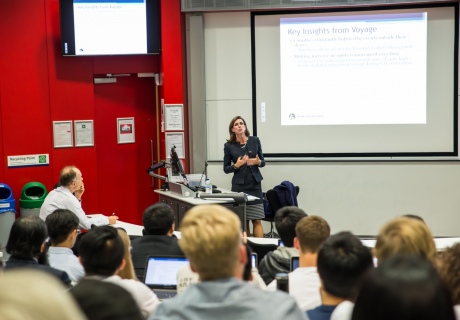The UK can survive Brexit without further interest rate cuts, says Forbes

The impact of Brexit will be "less stormy" than expected, said a Bank of England policy maker to an Imperial audience last night.
In a lecture at Imperial College Business School, Kristin Forbes, an external monetary policy committee member (MPC), defended the Bank's post-referendum measures but stressed there was no need for further action.
Forbes said that the UK had been only moderately affected by the economic shock following the result of Britain's vote to leave the Eureopean Union. She said that although growth would be slow, the economy did not currently merit a further cut in interest rates.
Addressing a full audience of staff, students and media at the Business School, Forbes said: “The initial effect on the UK economy of the referendum has been less stormy than many expected. The economy is experiencing some chop, but no tsunami. Looking forward, I am not yet convinced that additional monetary easing will be necessary to support the economy. The behaviour of UK consumers and businesses, and evolution of prices, will be critically important in determining the appropriate action.”
The fishermen in the boat need to stay vigilant, and may already be a bit seasick from the chop they have already encountered, but if the current weather continues, they should be able to sail home without more aid.
– Kristin Forbes
External member, Bank of England Monetary Policy Committee
She said that while the impact of Brexit on the UK economy was less severe than expected, there was a need for consumers to be resilient and for businesses to play their part in hiring and retaining their workforce.
She also explained that weaknesses in the housing market had been partly offset by 'strong consumer spending'.
She compared the UK economy to a fishing boat at sea, referring to a Japanese print which she used to illustrate her talk. She said: “The fishermen in the boat need to stay vigilant, and may already be a bit seasick from the chop they have already encountered, but if the current weather continues, they should be able to sail home without more aid.”
However, Forbes warned that the current state of the economy could change depending on future economic forecasts. Looking to the future she asked: “Will wages and domestic costs continue their gradual increase towards levels consistent with the 2% inflation target? How much and for how long will inflation be pushed up by the increase in import prices arising from sterling’s depreciation? And even if the UK manages modest growth and a restrained increase in domestic prices over the next few quarters, will there be any negative events originating abroad that present risks?”

Forbes is one of nine members of the Bank of England’s Monetary Policy Committee, whose role is to determine UK interest rates. Her current stance on interest rates contradicts the position of most of the other members of the MPC. Last month the MPC cut interest rates to a new record low of 0.25 percent – a move which Forbes supported.
Forbes’ comments came during a lecture attended by Professor David Miles, former MPC member, where she explored how economics shocks in different countries can have a global impact. She discussed why “economics tremors” in some countries evolve into major crises, with the potential to spillover into other countries’ financial markets and cause harm to economic growth while at other times these “tremors” remain contained as “small ripples”. She discussed the different patterns of these global spillovers during times of economic stress.
Professor Franklin Allen, Executive Director of the Brevan Howard Centre at Imperial College Business School said: “I was impressed with the scope of Kristin’s talk, which highlights that now, even eight years after the global financial crisis, there remains an urgent need for us to better understand the causes and effects of financial contagion. It is a complicated phenomenon that takes many different forms and can cause havoc in the financial system that spills over into the real economy. This global challenge underpins a lot of our research in the Brevan Howard Centre.”
The lecture: Global economic tsunamis: Coincidence, common shocks or contagion? was organised by the Brevan Howard Centre for Financial Analysis at the Business School.
Article text (excluding photos or graphics) © Imperial College London.
Photos and graphics subject to third party copyright used with permission or © Imperial College London.
Reporter
Laura Singleton
Communications Division